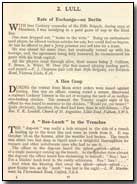Memoirs & Diaries - The Best 500 Cockney War Stories - Rate of Exchange - On Berlin and Other Stories
 Published in London
in 1921, The Best 500 Cockney War Stories
comprised, in the words of its newspaper publisher (The London Evening
News) "a remembering and retelling of those war days when laughter
sometimes saved men's reason".
Published in London
in 1921, The Best 500 Cockney War Stories
comprised, in the words of its newspaper publisher (The London Evening
News) "a remembering and retelling of those war days when laughter
sometimes saved men's reason".
The collection of short memoirs, some 500 in total, is divided into five categories - Action, Lull, Hospital, High Seas and Here and There. This page contains five stories from Lull, led by Rate of Exchange - On Berlin.
Other sections within the collection can be accessed using the sidebar to the right.
Rate of Exchange - On Berlin
With four Cockney comrades of the Rifle Brigade, during 1915 at Fleurbaix, I was indulging in a quiet game of nap in the front line.
One man dropped out, "broke to the wide." Being an enthusiastic card player, he offered various articles for sale, but could find no buyers. At last he offered to find a Jerry prisoner and sell him for a franc.
He was absent for some time, but eventually turned up with his hostage, and, the agreement being duly honoured, he recommenced his game with his fresh capital.
All the players came through alive, their names being J. Cullison, F. Bones, A. White, W. Deer (the first-named playing leading part), and myself.
F. J. Chapman (late 11th Batt. Rifle Brigade), 110 Beckton Road, Victoria Docks, E.16
A Hen Coup
During the retreat from Mons strict orders were issued against looting.
One day an officer, coming round a corner, discovered a stalwart Cockney Tommy in the act of wringing the neck of an inoffensive-looking chicken.
The moment the Tommy caught sight of his officer he was heard to murmur to the chicken, "Would yer, yer brute!"
Quite obviously, therefore, the deed had been done in self-defence.
The Rev. T. K. Lowdell, Church of St. Augustine, Lillie Road, Fulham, S.W.6
A "Baa-Lamb" in the Trenches
The "dug-out" was really a hole scraped in the side of a trench leading up to the front line and some 50 yards from it. It was October '16 on the Somme, after the weather had broken.
The trench was about two feet deep in liquid mud - a delightful thoroughfare for runners and other unfortunate ones who had to use it.
The officer in the dug-out heard the splosh-splosh-splosh of a single passenger coming up the trench. As the plosher drew abreast the dug-out the officer heard him declaiming to himself: "Baa! baa! I'm a blinkin' lamb lorst in the ruddy wilderness. Baa baa!..."
And when the bleating died away the splosh—splosh—splosh grew fainter too, as the "lamb" was lost in the night.
L. W. Martinnant, 64 Thornsbeach Road, Catford, S.E.6
He Coloured
When serving with the Artists' Rifles in France we went into the line to relieve the "Nelsons" of the 63rd (Royal Naval) Division.
As I was passing one of their men, a regular "Ole Bill," who was seated on the fire-step, I heard him say, "Artists' Rifles, eh; I wonder if any of you chaps would paint me a plate of 'am and eggs!"
R. C. Toogood, 43 Richmond Park Avenue, Bournemouth
Why the Fat Man Laughed
During the winter of 1914-15 the trenches were just like canals of sloppy mud, and dug-outs were always falling in.
To repair the dug-outs pit-props were used, but they often had to be carried great distances up communication trenches, and were very difficult to handle.
The most popular way to carry a prop was to rest one end on the left shoulder of one man and the other end on the right shoulder of the man behind.
On one occasion the leading man was short and fat, and the rear man was tall and thin. Suddenly the front man slipped and the prop fell down in the mud and splashed the thin man from head to foot. To add to his discomfort the little fat man gave a hearty laugh.
"Can't see anything to larf at, mate," said the mud-splashed hero, looking down at himself.
"I'm larfing," said the little fat Cockney, "'cos I've just remembered that I tipped the recruiting sergeant a bloomin' tanner to put me name down fust on his list so as I'd get out here quick."
A. L. Churchill (late Sergt., Worcs. Regt.), 6 Long Lane, Blackheath, Staffs
Next - He Met Shackleton! and four other stories
"Suicide Ditch" was a term used by British soldiers to refer to the front-line trench.
- Did you know?
